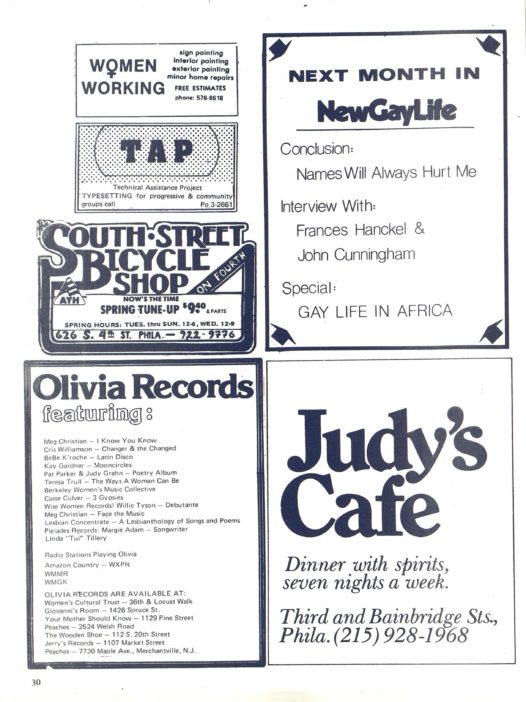This Olivia Records Advertisement was featured in the April 1978 issue of New Gay Life magazine. Both of the band’s albums were distributed by Olivia Records, a prominent all-women record label at the time. However, the band never signed with the label.
While the Berkeley Women’s Music Collective had a great admiration for Olivia and what they were doing for the women’s music community, the band also felt they did not fit in with the women who ran the label and sought more independence than what the label had to offer.
*
Below Nancy Vogl, Debbie Lempke , and Suzanne Shanbaum speak about the band’s relationship with Olivia Records.
Nancy: Some of it was small group power dynamics. Like you’re in your town and you and your peers are kind of big cheeses and all of a sudden an entire cheese wheel moves up from LA, and then they’re the bigger cheese… We fell into somewhat of a defensive posture. We didn’t know these women, they didn’t know us, so there was a little bit of tension.
Lily: So Olivia distributed your two records, but you guys never signed to that label. Do you think that these power dynamics were part of that decision?
Nancy: We were a little “outside” of their brand because they focused on their primary artists. It made sense because they only had so many resources; it’s not like they had a big bankroll.
They had to focus their resources into the four artists they were really into: Meg Christian, of course, was their first one, and then Cris Williamson did “Changer and the Changed.” Because they had the distribution network set up, it seemed silly not to just use that as a way to get out other womens’ music. We understood that; it was fine.
Lily: So you both of the, the Berkeley Women’s Music Collective albums were distributed by Olivia. But you guys weren’t actually signed with that label or?
Suzanne: No, we weren’t signed with that label.
Lily: Do you think that’s because you were a band and not solo, and not solo artists?
Suzanne: Well, I don’t know. It was a strange relationship. They formed a record company based in LA. They were funded and college educated. They had 2 or 3 artists that were solo acts whose material mostly focused on love songs. We were in Berkeley, a young, hungry, scrappy, DIY band who wrote about social issues. Berkeley was our community. Then they moved into Berkeley and it did set up a strange dynamic.
We lived in different worlds. I mean, for 50 cents I could buy a can of chunky beef soup which was my dinner. One day I would buy a smoked Turkey leg for, I don’t know, 75 cents or something like that, that’d be food for that day. I worked three days a week as an assistant auto mechanic in downtown Berkeley, but I still qualified for food stamps.
We were not entrepreneurs. We were scrappy, hungry, with a mission. We were from a different social class. At one point they offered to sign us, if we would go on tour in the South, they thought we would be good for the South and we were like, “Go to the South? No, we’re going to Boston.”
Debbie: It was to our benefit that they picked up the album. I think it took us a long time to get our money and things like that. But I’m glad to say Olivia picked us up. It would have been much harder to get the record distributed. So overall it was good.
